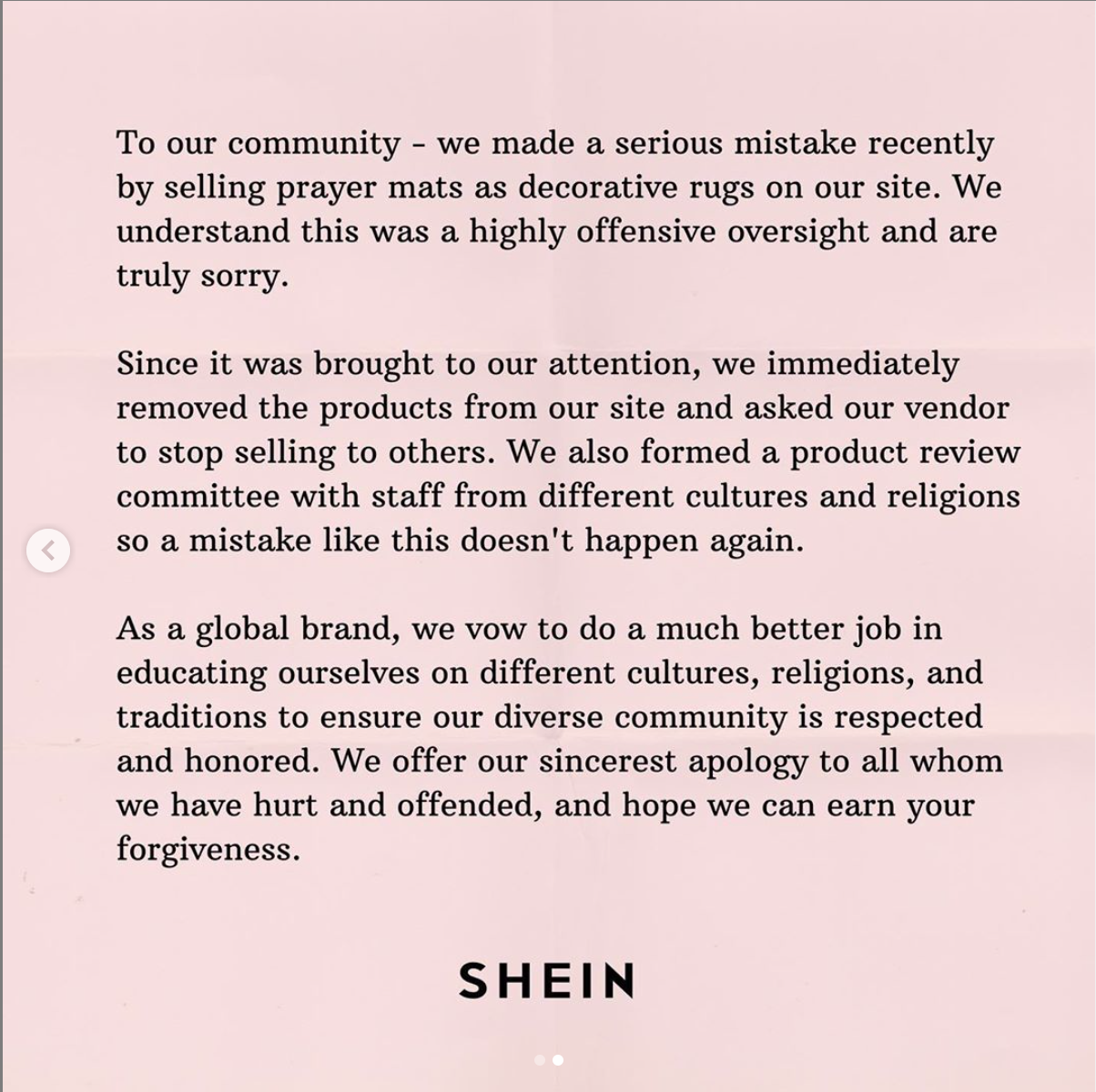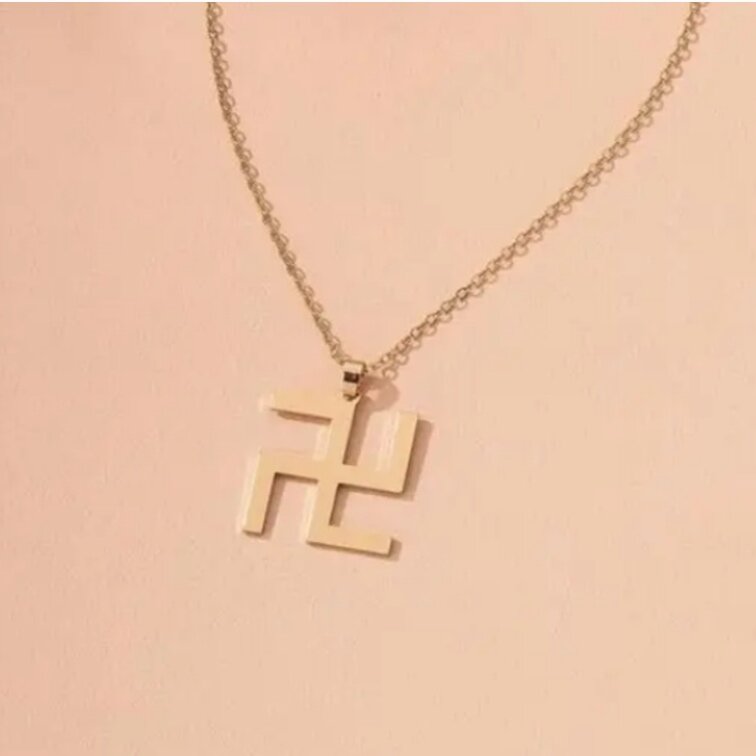Everything Wrong With Shein
You’re going to want to take notes.
by MYKENNA MANIECE ★ JULY 20, 2020
We’re all familiar with the influencer-approved, on-trend site Shein where $7 dresses and $5 tops are the norm, but recent scandals have forced us to dig deeper into the brand and its practices. From advertising swastika necklaces, to selling Muslim prayer mats as decorative rugs, to perpetuating the issues of fast fashion, Shein has had a lot of apologizing to do. If this alone doesn’t convince you that it’s time to stop shopping on the site (it really should, but okay), keep reading to learn more.
Founded in October 2008, Shein markets itself as “an international B2C [business-to-consumer] fast fashion e-commerce platform” that “prides itself on offering on-trend styles catering to both young women and teens, that won’t break the bank.” Sounds great, right?
Let’s start by breaking down what “fast fashion” actually means. According to Oxford languages, fast fashion is “inexpensive clothing produced rapidly by mass-market retailers in response to the latest trends.” Shein CMO Molly Miao recently revealed to Forbes that the company drops “700-1,000 new styles daily.” Yes—daily! Considering many of their clothes are made with synthetic fabrics such as polyester and nylon, this is a huge environmental problem because these fabrics do not decay. The general lack of quality associated with the brand (don’t worry, we’ll get to this later) suggests that many of the clothes they produce will end up contributing to the mass of textile waste found in landfills today. The fashion industry is already responsible for 10% of the world’s annual carbon emissions, and the rise of fast fashion is only worsening this problem. According to the World Bank, the “industry’s greenhouse gas emissions will surge more than 50% by 2030” if we continue to produce at this incredible rate. Therefore, in order to save our environment, it’s time to reevaluate the fashion industry’s current model and look to more sustainable alternatives.
Now let’s say that you really needed a cheap dress for formal so you decide to purchase something anyway. Unfortunately, it’ll likely take at least a month for your package to arrive, if not longer. This is a far cry from the previously advertised “seven working days” delivery timeframe. Of course, given the pandemic, the company has updated its anticipated shipping times to be about 18-28 business days, but YouTuber Sarah Hawkinson stated that this timeframe was more accurate even before the coronavirus. The company’s Twitter replies are currently flooded with dissatisfied customers who haven’t received their packages and have had little to no response from customer service. With experiences like these, it’s no wonder that Shein has an F-rating from the Better Business Bureau.
Credit: Twitter (@SHEIN_official)
Okay, we’re gonna keep going and assume that your formal dress finally arrives! You open the package, excited to finally try it on when you realize that it looks nothing like how it appeared online. Admittedly, this issue doesn’t occur every time but the inconsistency is definitely something to be aware of. To give you an idea of just how different people’s experiences have been, let’s look at three different YouTuber reviews.
Laura Lee: video posted June 24, 2020 with approximately 570,000 views: Despite waiting about a month for shipping, Lee described her overall experience with this purchase as “extremely successful,” compared to previous hauls where some items didn’t work out. It’s important to note that there were a few instances throughout the video where she noted differences in sizing.
Credit: YouTube (@Laura Lee)
Brianna Renee: video posted January 29, 2020 with approximately 443,000 views: Brianna gave the company a 4/5 rating for shipping/packaging; a 3.5/5 for advertising; 2/5 for fit; and described the quality as poor. Overall, she described her experience as “hit or miss.” Quick tip: skip to 6:00 to hear her Shein review.
Credit: YouTube (@Brianna Renee)
Mousy Leigh: video posted March 17, 2020 with approximately 19,000 views: To put it bluntly, Leigh’s experience was a disaster. She described many of her items as cheap and noted how a few of them were missing seams, making them look like just cut pieces of fabric. Leigh even went so far as to describe one of the items as something “like the quality you would find in the Halloween costumes at Walmart.” Ouch… Finally, she noted that two of the items she received were the wrong colors compared to the advertising.
Credit: YouTube (@Mousy Leigh)
It’s clear that each of these women had vastly different experiences with the company, but if this inconsistency doesn’t deter you, we’ll just move on to the next concern: design stealing.
Shein has been accused of copying the designs of several smaller fashion brands. Jezebel initially reported about the company using designs from the LA-based indie brand Valfré back in 2018. Valfré’s founder, Mexican-born artist Illse Valfré, told Jezebel that “customers started sending [them] photos through Instagram and email, alerting [them] to identical copies of [their] product.” Valfré also released a statement expressing her frustration with fast fashion companies continuing to reuse her artwork (Forever 21 and Rue 21 had done the same in 2017), explaining that it “shows how little they care about artistic vision and meaningful designs.” For her full statement, click here.
Credit: Jezebel
Now, once again Shein has ripped off the designs of brand Flaws of Couture. On June 19, the brand’s founder Sashagai took to Instagram posting a side-by-side comparison of her brand’s t-shirt and the one on Shein’s site. She wrote that she still hadn’t heard back from Shein about the matter and further revealed the following: “I have countless DMs of people saying they bought it and had no idea who I was. That’s a shame. Because that was an opportunity for you to do WHAT YOU SAY and support Black people and designers. The lies. The exploitation. It. Never. Ends.” Her full statement can be found here.
Credit: Instagram (@flawsofcouture)
With this information in mind let’s use our spending power to support small, women-owned businesses rather than massive fast fashion retailers.
Finally, it’s time for the moment you’ve probably all been waiting for—addressing Shein’s racial insensitivity.
On July 3, customers noticed that the company’s “Fringe Trim Greek Fret Carpet” actually resembled Muslim prayer rugs and were quick to call them out on Twitter. Forbes explained that some of them had imagery of religious symbols like the Kaaba, which prompted an even greater outcry from Muslim activists. Shein published an official apology on their Instagram on July 5, which you can read below.
Credit: Instagram (@sheinofficial)
Then, less than a week later the company was under fire again, this time for selling a swastika pendant necklace. In their apology, Shein explained that it was a Buddhist swastika, but given the symbol’s historic association with Nazism, they “should’ve been more considerate of the symbol’s hurtful connotations to so many people around the world.” Now for all of you who may be wondering what a Buddhist swastika is, the symbol traditionally symbolized “the feet, or the footprints, of the Buddha” and “has been used to denote plurality, abundance, prosperity, and long life.” Though there is a difference between the Buddhist and Nazi versions of the symbol, Shein’s decision to sell such a product was obviously tone-deaf and disrespectful to the Jewish community.
Credit: Forbes
Credit: Instagram (@sheinofficial)
So there you have it. Hopefully this insurmountable evidence against Shein is enough to convince you that their $5 tops are simply not worth it. Once again, let’s remind ourselves to try to shop sustainably, ethically, and with women and Black-owned businesses when possible.
Sources:
https://jezebel.com/fast-fashion-retailer-shein-accused-of-ripping-off-indi-1828518935
https://www.youtube.com/watch?v=K5xeVmjj4cs
https://www.bbb.org/us/nj/n-brunswick/profile/online-retailer/shein-0221-90171997
https://us.shein.com/About-Us-a-117.html
https://www.worldbank.org/en/news/feature/2019/09/23/costo-moda-medio-ambiente









